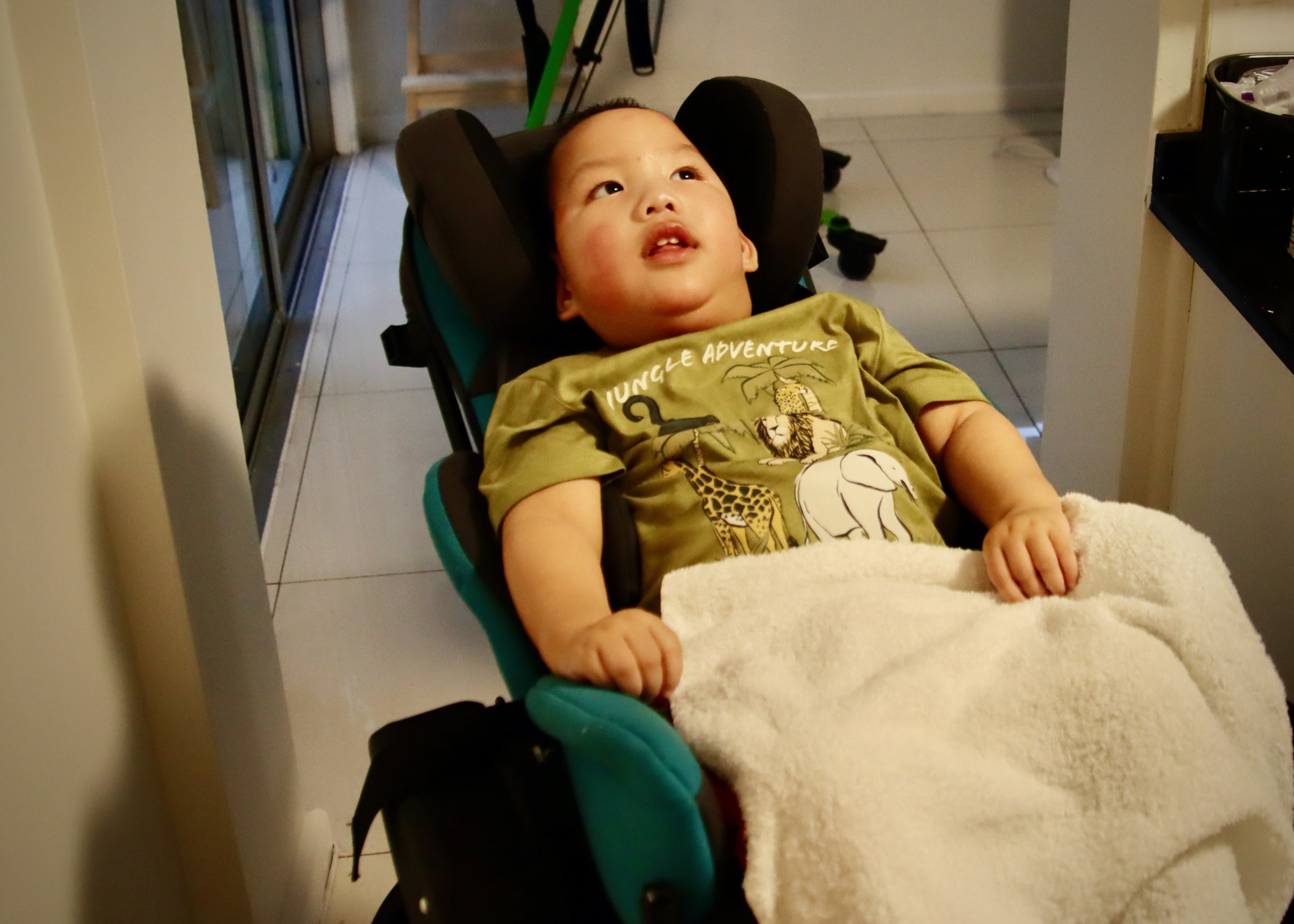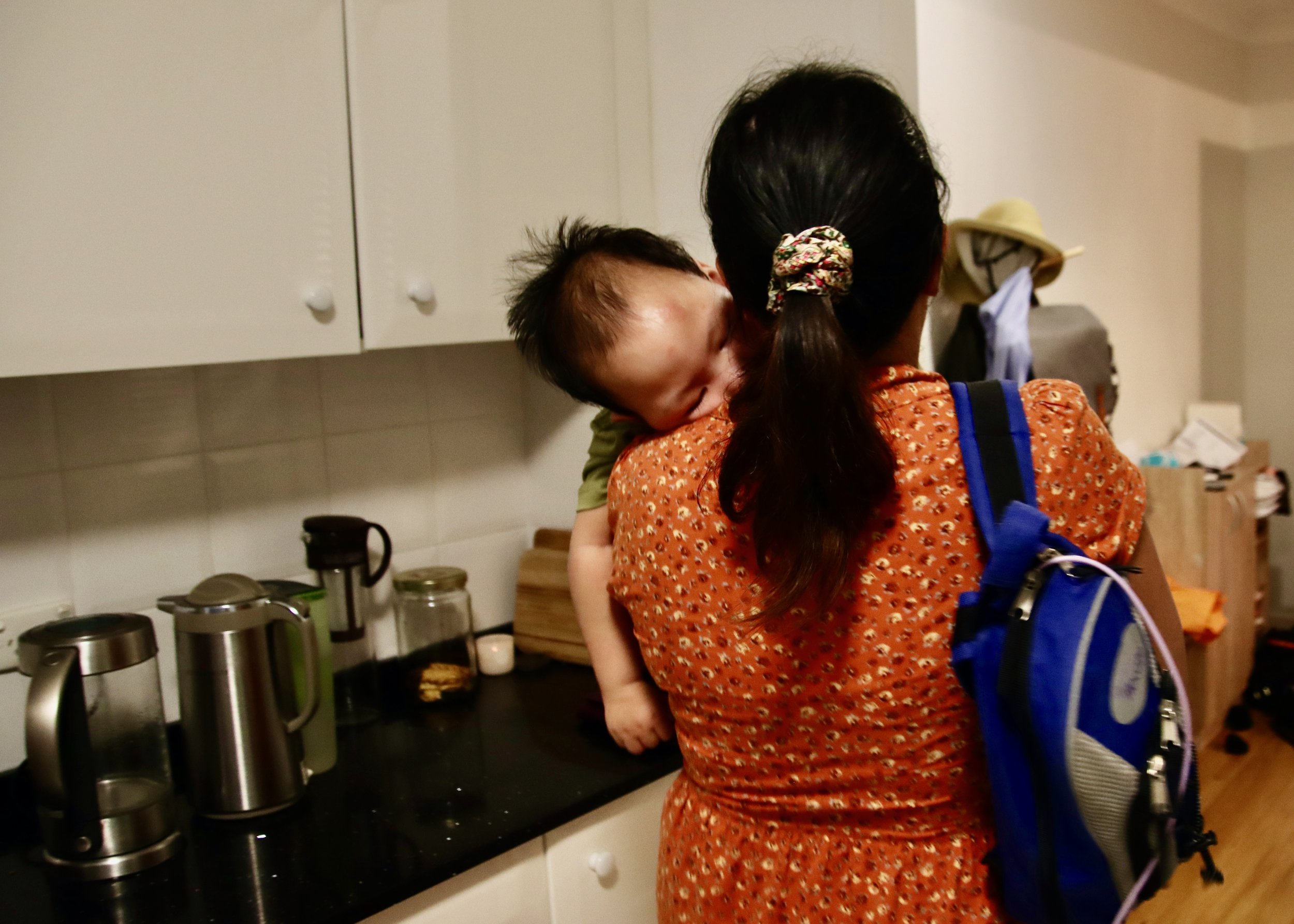The Journey of Acceptance
An interview with Tash Lo
By Fiona Jongsma
Scratching just below the surface I realise that Tash’s story will be intriguing. Her childhood home was on the tropical island of Vanuatu where she lived along with her younger sister and parents. Her faith was taught and fostered solely by her mother as there were simply no Chinese churches. Tash’s mum shared Bible stories with her and her sister and taught them how to pray. She learned from her mother that God was good and that he was their Father and friend who was always there for them, especially through hard times - how tried and tested these words became for Tash.
To those who know her, Tash is an encourager, not necessarily with words, but with acts of service. Describing herself as overconfident in the past, she sits with me now as someone who has released a lot of that self-confidence. Instead, her confidence is in God. What brought on such a transformation? It was the gift of being Isaac’s mother.
Tash is a registered nurse. While nursing in a hospital ward in South Sydney she met her husband Vincent, also a nurse. When they were expecting their first child in 2020, Tash imagined the future full of what she’d seen in other young families - playdates with other mums and enrolling her son in childcare one day. When Isaac was born these expectations were cast off as Tash plummeted into the toughest season of her life. Isaac had a number of struggles, reflux and constant vomiting, but more concerning, his eyes wouldn’t track things moving, even by six weeks old. As a nurse Tash knew this was a sign of something abnormal in Isaac’s brain. She tells me this realisation sent her to ‘the lowest of lows’ for the next two months. Every night she cried from intense grief, anguish and anger at God. And the unknowns of the future.
Vincent encouraged her that maybe they needed to “give it time.” That was until Isaac’s first MRI, which showed that Isaac’s brain was significantly underdeveloped. Later tests showed a genetic deformity (from the gene TUBB2A). The brain folds in Isaac’s brain weren't fully formed.
Isaac pays attention to Tash's voice as she prepares his night medication
Tash and Vincent were devastated. There was no sign of this in the ultrasounds. “Why God?” Tash pleaded. Before she knew it though, Tash became disinterested in talking to God at all. She lost interest in talking to anyone.
What protected her faith she says now, was the prayers of those around her, and the Holy Spirit. And space to grieve and be angry. Tash was grateful that her Christian community and family didn’t tell her ‘God is good’ or quote Bible verses at her. They allowed her to question, rather than making the knee-jerk conclusion that she was falling away from her faith. Tash knew God was good, but she didn’t know why her life had to include such suffering and pain as this.
Despite the devastation, Tash says she turned around quickly at a pivotal moment. A diagnosis. Having a diagnosis for Isaac’s condition gave Tash relief from constantly analysing what was wrong. Now they knew. She still cried, but not as often.
Tash carries Isaac to bed with his gastrostomy feeding pump over her shoulder
Vincent on the other hand entered his own deep valley when they received the diagnosis. He’d told God in the past, well before being a parent, that he couldn't handle parenting a child with a disability. Tash and Vincent were clearly at different stages of acceptance.
While this may have seemed like a gulf between them, Tash looks back on it as God’s grace. When she was deep in grief during the first few months of noticing Isaac’s symptoms, Vincent could encourage her and in turn she could do this for him when he was in deep despair months later.
Now, having become father to a child with a disability, Vincent has realised, with God, he can fulfil this role. He is fulfilling this role. Tash sees the growth in her husband since Isaac has come into their lives. Vincent is “more emotionally open, more present and supportive, more humble” she says.
Tash and Vincent feel they’ve been given the resilience they need to be parents to Isaac. Isaac’s birth was “not an accident, God knew what he was doing in bringing him into our lives,” Tash says. They may not be on the journey they envisioned but Tash says with conviction that she, Vincent and Isaac are on “another journey.” This has helped them to accept Isaac as he is, rather than comparing his development to that of other kids. “You know Isaac [doesn’t] reach any milestones, even to this day.” But God has created Isaac in His image, uniquely “according to what He values,” she says. Tash confirms the truth that has inspired Christian service of those with disabilities for generations past, that our value is not in what we do or in our productive capacity. Our value is only in our belonging to God, being a person he has created to reflect his glory.
Vincent, Tash and Isaac
Many of us may not realise it, but people with disabilities are relatively absent from churches despite living in most suburbs. Tash however says of her church, Blakehurst Baptist, “God placed us in this church.” No one is fazed by Isaac’s loud coughing during the service she tells me. People seem to care more for him because of his vulnerability. He’s precious to the community. Tash can see that having Isaac in church has made people more servant hearted, and “they want to understand” him. She recalls that one day Isaac vomited on a pillow at church. Another mum discreetly took the pillow home and washed it without a word.
Tash says that both her and Vincent have a deeper faith and trust in God since they started this journey with Isaac. Spending time together reading the book of Job in the Bible was a great help. They were reminded that God was still with Job as he suffered, and he was just as present with them. They felt “less lonely.” A difference she notes in both her and Vincent now is that “our hearts are more aligned to what God wants more than what we want.”
Of herself she says, “I feel more grounded in God and I don’t feel as insecure because I know where all my hope is and what God has for me.” This has come from a profound experience of loneliness. “You know a lot of people care and support you (...) but they don’t really know how you feel, or what it's really like until they walk in your shoes, and that’s what makes it lonely.” She describes, “there was one day my husband was at work and it was just me and Isaac. He had vomited so I changed him. And then I thought ‘I'll put him back into bed and then do another small feed’. And then he vomited again all over the bed. I just felt so deflated and alone. But then I was reminded of psalms [songs in the Bible] like Psalm 139 and Psalm 23. Even if I think I am alone, I'm not because God is there, he can see and actually feel everything that I'm going through (...) I think that was a big turning point. To know that I wasn’t alone. That everything I do isn’t futile, because it felt futile.”
Tash soothes Isaac after positioning him in side-lying at bed time. This position helps prevent saliva travelling down his windpipe
God also provided people to walk alongside her. During one of Isaac’s hospital stays a mum who’d known that endless cycle of visits with her own child contacted Tash. She asked if Tash needed anything. Nothing came to mind so the friend suggested a coffee. She asked her husband to make one and he drove it over to the hospital. The coffee arrived in her friend’s sealed mug, that way it wouldn't be turned away when she tried to enter Isaac’s ward with hot liquid. She was told to keep the cup for future hospital visits. Through her friend’s actions Tash felt some of God’s love and care. The feeling of being so alone, watching her baby lie there attached to medical devices, was quieted. It “made my day” she reflects.
Precious Isaac’s lifespan is unknown, though not to his Heavenly father. He has a severe case of epilepsy with seizures that can’t be fully controlled. Though the regular emergency visits have stopped as Isaac’s airway isn’t blocking during the seizures, his neurologist has told Tash and Vincent that his prognosis isn’t good. They have made a plan together for when Isaac’s condition becomes critical about whether or not to use life support. Isaac is known to a palliative care team as well.
Isaac's 24 hour care routine. Image credit: Nikki Lo
Through a counsellor, Tash has been able to process her emotions and feelings and even to confront her fears about Isaac’s death. Doing so has made her feel less intimidated by the thought. She and Vincent have managed to accept that even this is part of Isaac’s journey.
Tash strongly encourages parents of kids with disabilities to get counselling. She also says it’s better to “find out everything” about your child’s condition. “You’ll find people in similar circumstances” she assures, and shares with me how helpful it’s been to be a part of The 139 Collective, opening up friendships with other mums in the group. “There are also Saturday catch up’s for Dads.”
“It does get better,” Tash wants to tell other parents. “It felt like the end of the world but it wasn’t.”
Tash and Vincent’s word for 2023 is ‘restoration,’ a work that Jesus is ever-ready to do for us. He says: “Come to me, all you who are weary and burdened, and I will give you rest.” (Matt 11:28, NET)
Fiona Jongsma is a Chaplain and Occupational Therapist at Olive Tree Therapy. She has a Masters of Divinity from Sydney Missionary and Bible College. She hopes to keep investing in ‘spiritual children’ throughout life and is also a proud aunty.
The views and opinions expressed on this site are those of the authors and do not necessarily reflect the official position of The 139 Collective. As a collective, we seek to humbly learn from each other’s experiences and remember the unity that we share in Christ even when our current viewpoints on the difficult topic of disability differ.





